





Prof. Cathal Kelly
RCSI Vice Chancellor and CEO / Registrar
Our core mission to ‘Educate, Nurture and Discover for the Benefit of Human Health’ remains at the heart of everything we do. RCSI are also fully committed to delivering on our pledge to achieve net zero carbon by 2050 to protect our planet for generations to come. We will achieve this by meeting the public sector mandate as outlined in the Irish Government’s Climate Action Plan.


Ms. Abi Kelly
RCSI Director of International Engagement and External Relations and Senior Management Climate and Sustainability Champion
RCSI’s strategy 2023-27 ‘Innovating for a Healthier Future’ places sustainability at its core, around which all other pillars are supported. RCSI are committed to the UN Sustainable Development Goals, and in 2023 RCSI were ranked No.1 in the world in the Times Higher Education Rankings for UN SDG 3, Good Health and Wellbeing. RCSI have received numerous accolades in sustainability, most recently Best Sustainable Business at the 2024 PWC Business Post Sustainability Awards, other notable awards include Best Green Campus, The Green Healthcare Award and the Sustainable Energy Achievement Award. Through our Green Campus group RCSI achieved the Green Campus Flag from An Taisce in 2019, an accreditation we have retained since. RCSI have embarked on ISO 50001 accreditation for Energy Management and expect to achieve the international gold standard in energy management in 2024. In 2023 RCSI established a cross-functional Sustainability and Climate Health Committee, and appointed Senior Leaders to guide the implementation of our climate, sustainability and energy policies.


Mr. Ronan Baxter
RCSI Director of Estates and Support Services and Energy Performance Officer
This Climate Action Roadmap outlines how we plan to deliver on our sustainability targets over the coming years. With a strong focus on health and societal impact, we will, working with others, make a positive and lasting impact on the health and wellbeing of individuals and communities in Ireland and around the world. Key priorities within this plan include upgrading our building stock and technology to optimise energy efficiency, the roll out of renewable energy projects across our estate, increased education and awareness for staff and students, and adopting a systematic approach to energy and carbon management.
RCSI is privileged to have a deep professional responsibility to enhance human health, which is intertwined with planetary health. This Climate Action Roadmap will help us navigate the challenges ahead all the while supporting our core mission to ‘Educate, Nurture and Discover for the Benefit of Human Health’
Prof. Cathal Kelly
RCSI Vice Chancellor and CEO / Registrar
Ms. Abi Kelly
RCSI Director of International Engagement and External Relations Senior Management Climate and Sustainability Champion
Mr. Ronan Baxter
RCSI Director of Estates and Support Services Energy Performance Officer

Our mission is to Educate, Nurture and Discover for the Benefit of Human Health.
The Royal College of Surgeons in Ireland (RCSI) is an independent medical professional and educational institution, which is also known as RCSI University of Medicine and Health Sciences. Our ultimate purpose is to work in the service of patients; a deep professional responsibility to enhance human health through endeavor, innovation and collaboration in education, research and service informs all that we do.
RCSI provides both undergraduate and post graduate education, in addition to classroombased learning RCSI also houses several large-scale research facilities focused on human health sciences. The primary location for these activities is within the RCSI’s campus located on St. Stephens Green and surrounding areas. Education and research are also provided at our satellite sites in the greater Dublin Region as well as within our partnered hospitals nationwide. RCSI is responsible for its own energy management.
The Public Sector Climate Action Mandate 2023 was published in CAP 23 and approved by the Government in May 2023. The Mandate requires public sector bodies to show leadership in climate action by taking, and reporting on, the actions of the Mandate. All Public Bodies who report under the existing SEAI Monitoring & Reporting (M&R) system are required to follow the Mandate. The adoption of the Mandate will support public sector bodies leading by example in demonstrating the necessary climate action to reduce Ireland’s Green House Gas (GHG) emissions by 51% by 2030.
This Climate Action Roadmap (CAR) is based on SEAI, and Environmental Protection Agency (EPA) published guidance1 on minimum requirements for small public bodies. Under this guidance, a small public body consumes less than 50 GWh of energy per year; in 2022 RCSI consumed approximately 16.5 GWh of primary energy2. The CAR will be reviewed and updated regularly, and within 6 months’ of any update to the Climate Action Plan; these updates will take account of any changes in the mandate and any additional guidance published by SEAI and the EPA.
1. “Public Sector Bodies Climate Action Roadmaps Guidance 2023”, V1.1, SEAI & EPA.
2. Source: psmr.seai.ie, August 2023.

RCSI’s targets are derived from the Climate Action Plan published by the Irish government in 2023. The Climate Action Plan looks to the public sector to take the lead in promoting comprehensive climate action that affects society at large, as well as its buildings, transportation, waste, and energy use. In order to achieve these goals, the public sector will need to reduce its emissions by 51% in 2030 and increase energy efficiency by a further 50%, based on 2020 baseline data. In addition, the public sector will implement green public procurement practices, accelerate retrofitting of public buildings, and increase climate and carbon literacy levels.
Therefore, RCSI’s targets are the same as for other public bodies:
• Reduce GHG emissions by 51% in 2030;
• Improve energy efficiency by 50% by 2030.
For the purposes of the Public Sector Climate Action Mandate, greenhouse gas emissions are taken to be energy-related carbon dioxide equivalent emissions. The baseline is the average of 2016-2018 emissions.
The GHG target is derived based on a 51% reduction of direct energyrelated emissions (thermal and transport consumption); plus, projected supply side reductions in indirect energy-related emissions from electricity. Public bodies must ensure that they meet BOTH the 51% reduction in direct energy- related emissions (thermal and transport) target and the overall total emissions reduction target.
RCSI’s main campus is at St. Stephen’s Green in Dublin City Centre. There are eight buildings located within the main University Campus. These comprise education and teaching buildings, library services, research facilities, sports and recreation facilities, professional services and student accommodation. RCSI’s estate also extends to satellite sites located at Beaumont Hospital and Connolly Hospital Blanchardstown.
RCSI’s buildings range in age from the 1810, 123 St. Stephen’s Green building, RCSI’s first building and now a protected structure, to 26 York Street which came into operation in 2018. The diverse nature of the estate presents significant challenges, such as the cost to appropriately retrofit these buildings to meet 2030 and 2050 targets. Also, given RCSI’s city centre location, available space for modern equipment such as heat pumps and renewable energy integration is limited which also presents further challenges for decarbonisation.
RCSI’s focus for the Climate Action Plan is to develop a strategy that will allow us to meet our goals through energy conservation (fabric upgrades, reduction of energy use), energy efficiency (system upgrades, implementation of heat pump technology), and energy generation (solar PV). This roadmap presents our global vision for these organisational goals and how we plan to achieving them.
CSI’s energy supply is derived from electricity and gas. The resultant emissions totalled 2,703 tCO2 in 2022, a 15.9% reduction on our 2021 emissions.
By 2022, RCSI had improved its energy efficiency by 44.6% based on its 2006 energy efficiency baseline. If this improvement is maintained RCSI’s energy efficiency would improve to 54.7% in 20303
RCSI will be implementing several energy efficiency projects in pursuit of our goals. As a result, we forecast an improvement of up to 60% should be achievable in 2030 based on current and forecasted energy usage trends, thereby exceeding the mandated target by 10%.
RCSI has a large, diverse mix of campus facilities. The Significant Energy Users (SEU’s) have been identified by analysing the annual energy consumption profile for each building (MPRN, GPRN) and the accumulated individual building total energy. The top 6 SEU’s represent 86% of RCSI’s total energy consumption. The chart below illustrates the breakdown of combined gas and electricity use for 2022 and the table clearly defines all the Significant Energy Users.
3. Based on RCSI’s 2006 Energy Efficiency Baseline
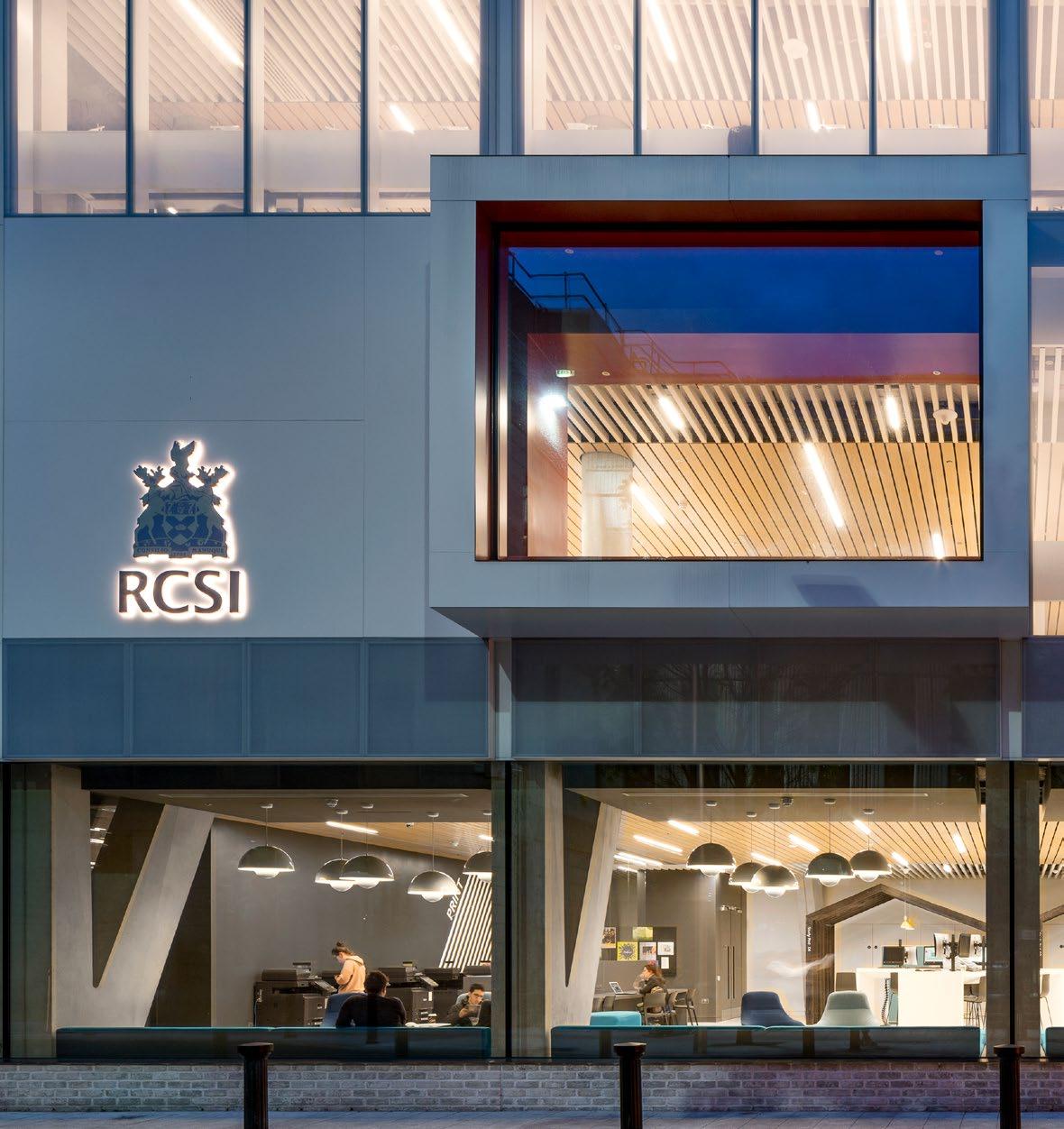
RCSI has been at the forefront of healthcare education since its establishment in 1784. Today we are an innovative, world leading, international health sciences University and research institution. Our students, educators and researchers collaborate for the benefit of human health in a truly immersive environment where teaching, research, public policy, and outreach activities focus singularly on building multidisciplinary excellence in healthcare.
This long-standing reputation as a world leading healthcare education institution coupled with the well documented climate crisis made the decision to address sustainability within RCSI a simple one. These factors combined presented an opportunity to provide leadership in the University Sector in carbon reduction initiatives in the form of an Energy Performance Contract (EPC) at RCSI’s flagship Library Building, 26 York Street.
This EPC project was the first of its kind in the University Sector in Ireland and the success of the project also serves to demonstrate the University’s ability to make a tangible impact on sustainability, conservation and environmental responsibility.
• The project commenced with a comprehensive assessment of building physics, HVAC system design, and installation.
• A virtual model was created within a cloud advanced building energy management platform. The virtual model mirrored operations at 26 York Street.
• Comprehensive simulations were carried out with custom algorithms and the building response evaluated.
• Opportunities were identified to target energy efficiency savings through ongoing simulation and evaluation.
• Custom performance algorithms apply formulas across various fields of BMS, and IoT data to form virtual data points that automatically optimise the control of the HVAC plant and provide unique insights into small but high impact operational nuances.
26 York Street has undergone a transformative enhancement through smart optimisation solutions, elevating its energy performance to a next-generation standard. The building’s gas consumption has been reduced by 73%, while electricity consumption saw a decrease of 27%, of which the HVAC portion has been reduced by over 70%.
HVAC Electricity Savings 70% = 200 tonnes/y
200 tonnes/y in Carbon Saved
Electricity Savings 27% = 349,290 kWh
4.75 years Payback Period

RCSI is an ambitious University and in the period to 2030 we plan to significantly progress our campus to support further growth, and to ensure RCSI continues as a leading University of Medicine and Health Sciences, with world-class facilities supporting teaching and research activities.
Several key building projects are currently under construction which will have an impact on RCSI’s carbon emissions in 2024 and 2025. The RCSI Education and Research Centre at Connolly Hospital is scheduled to open in September 2024 and Project Connect, a new state of the art research and teaching building at 118 St. Stephen’s Green is scheduled to open in 2025 The combined operational carbon emissions from both projects will amount to approximately 200tCO2
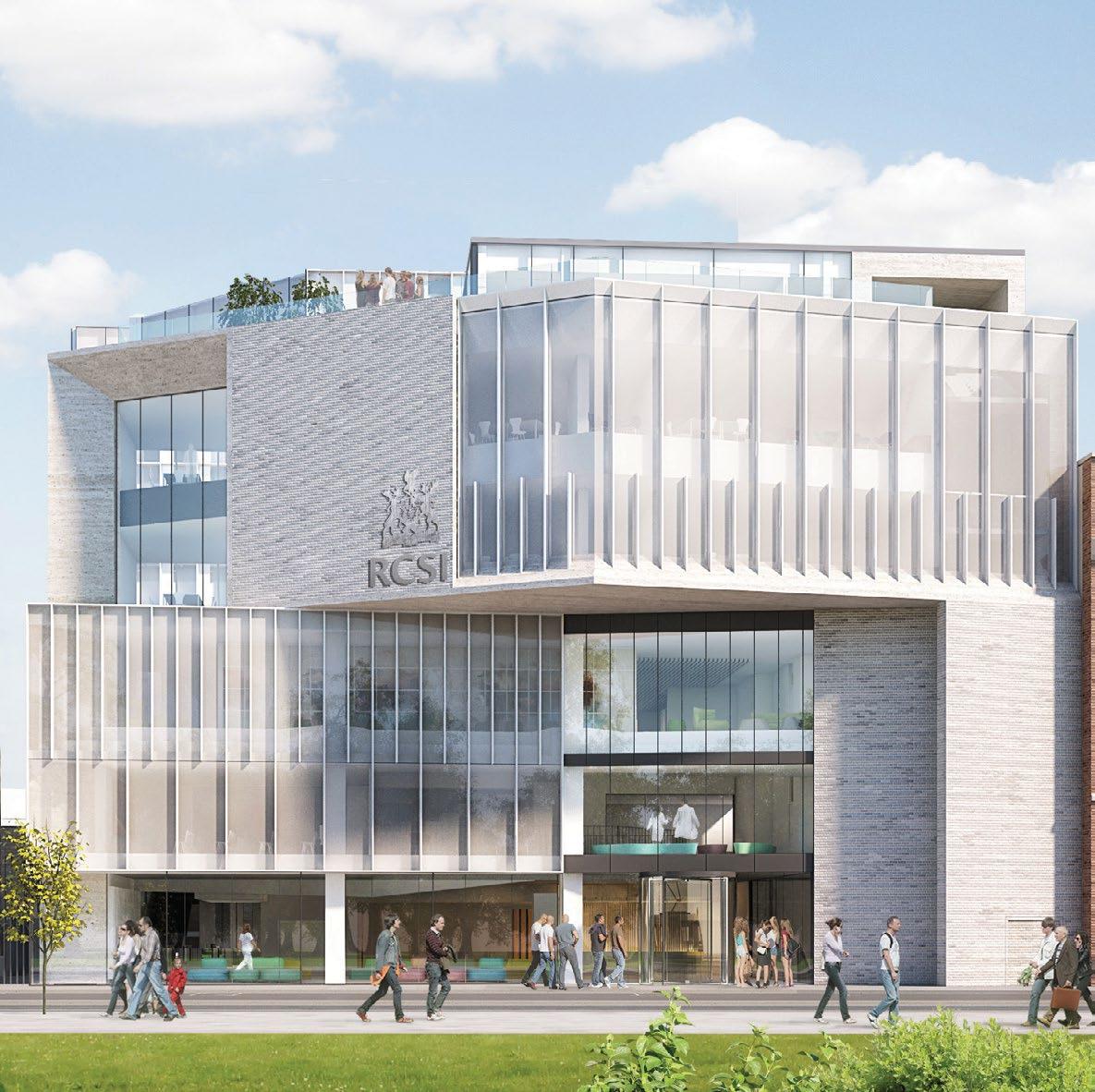
Another significant focus of development will be RCSI’s School of Dentistry. Based on current timeframes, the first of the new School of Dentistry facilities will be in operation in September 2025; the Dental Simulation Centre in Sandyford. This project will involve a deep retrofit of an existing educational building to the latest NZEB standards.
In the period 2026 to 2030 the School of Dentistry will expand further with Connolly Hospital Dental Education Centre (DEC) Phase 1 scheduled for operation in 2027, and a further two DEC facilities required by 2030. While sustainable building practices and energy efficiency design will be embedded in the design process, the School of Dentistry building programme is will increase RCSI’s total emissions by approximately 300tCO2 per annum.
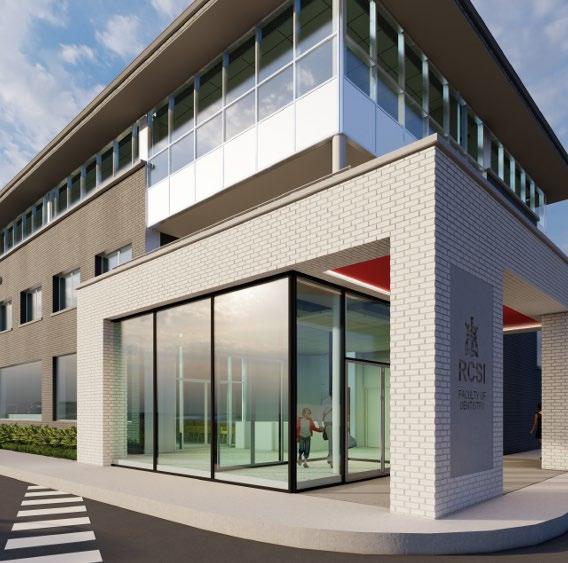
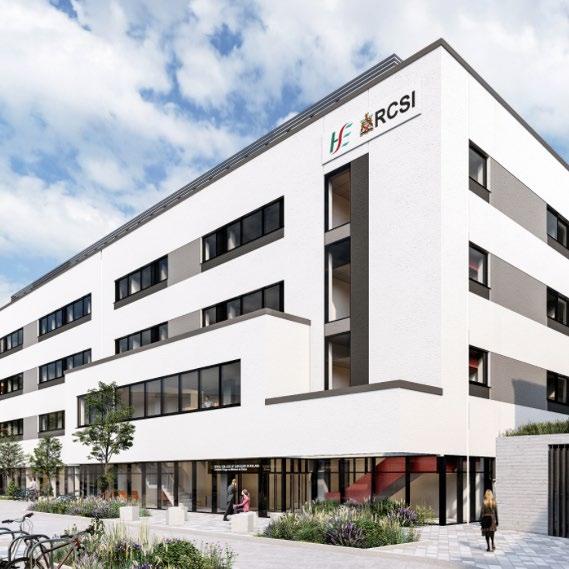
RCSI have identified key areas to achieve reductions in carbon emissions.
Table 2: Decarbonisation Initiatives
Energy Efficiency Energy Performance Contract (EPC)
Green Campus / Green labs
Thermal Energy Decarbonisation
Several key buildings have been identified for the installation of heat pump technology to reduce the need for burning fossil fuels on site.
Ongoing:
Since undertaking the Energy Performance Contract in 2021, RCSI increased energy efficiency by 20%. The EPC will continue for the next 3 years.
Ongoing:
RCSI are committed to having 100% of our labs
Green Labs certified by the end of 2024. One lab is to carry out their final survey and this goal will be achieved.
Ongoing:
A project list is in development with RCSIs 123 St Stephens Green teaching building identified for initial investment.
The retrofit of Reservoir House in Sandyford for the new School of Dentistry Dental Simulation Centre will increase energy efficiency performance by decommissioning gas boilers in lieu of high efficiency heat pumps.
Renewable Energy
Building Retrofits
Several key buildings have been identified for the installation of renewable energy technology to reduce electricity consumption on site.
Deep energy retrofits to upgrade Building Energy Rating (BER) – B2 minimum.
Ongoing:
A project list is in development with RCSIs Education & Research Centre at Beaumont Hospital identified for initial investment in Solar PV.
Ongoing:
A project list is in development with RCSIs Mercer Court student accommodation identified for initial investment.
Supply side decarbonisation
National grid decarbonisation
Ongoing:
Government policies target up to 80% renewable energy on the national grid by 2030, RCSIs will utilize grid decarbonization by electrifying our building stock where feasible.
RCSI have commenced a number of projects to achieve reductions in carbon emissions. The table below summarises these projects, which have all been budgeted and analysed to confirm the carbon reduction for each.
RCSI have a strategic five-year plan of projects which are currently in development. These projects have not yet reached design stage, so the carbon emission displacement has not been confirmed and is not included in our ‘Gap to target’. However, RCSI have developed our budget forecast for 2030 to ensure these projects are fully resourced prior to implementation.
RCSI’s total GHG emissions target for 2030 is 990 tCO2. In our current 2030 decarbonisation model which accounts for all known campus expansion plans and confirmed energy related upgrades to 2030, our total emissions are 1,360 tCO2. This leaves a residual ‘Gap to Target’ of 370 tCO2
RCSI is working to further develop our ‘Project Pipeline’ in 2024 to close the gap to target with a clear and resourced strategy. Note Table 4 ‘Projects In Development’.
2016-2018baseline(non-elec)increasesincebaseline 2022Supply-sidereductions Retrofits &efficiencyHeatpumpsBiomassboilers
switchingOtherfuel(heat)ElectricvehiclesHigh-blendbiofuelsCNG(transport)100%RES-EIncreasedenergy use(nonelec)2023(modellednon-elec)Gaptonon-electricityGHG2023Gapto non-electricityGHGtarget
switchingOtherfuel(heat)ElectricvehiclesHigh-blendbiofuelsCNG(transport)100%RES-EIncreasedenergy use(nonelec)2023(modellednon-elec)Gaptonon-electricityGHG2023Gapto non-electricityGHGtarget

RCSI is committed to creating a sustainable future for generations to come. Our Senior Management Team (SMT) has prioritised sustainability, recognising its vital role in shaping the future of health professionals education, research and healthcare.
This commitment is an integral component of our latest institutional strategy “Innovating for a Healthier Future (2023-2027)”. Through the development of this Strategy SMT has ensured that sustainability is woven into the fabric of our strategic vision, influencing decision-making processes across academic, research, engagement and campus operations..


The Sustainability and Climate Health Committee has evolved from our very successful Green Campus Committee which was established to enhance sustainability across campus operations.
Our Sustainability and Climate Health Committee was established to oversee a much broader scope with a stated goal to integrate sustainability seamlessly into the fabric of our education programmes, research, engagement and operational activities, ensuring a balance between the well-being of our community, the advancement of medical knowledge, and the preservation of our planet.
RCSI’s Sustainability and Climate Health Committee is comprised of key stakeholders from across the organisation, this includes; Senior Management Team, Estate and Support Services, International Engagement, Insights and Planning Office, IT, Communications, Finance, Human Resources, School Department Heads and the Student body.
Ms. Abi Kelly, Director of International Engagement and External Relations is the Climate and Sustainability Champion on SMT. In this role Abi has fostered a sustainability mind-set among SMT Colleagues, influencing decision-making processes, and ensuring that sustainability goals are seamlessly integrated into the fabric of the University.
SMT ensures reporting on the University’s progress towards a sustainable future. Regular updates and comprehensive reports are published, ensuring accountability and maintaining trust in our community.
Mr. Ronan Baxter, Director of Estates, is the nominated Energy Performance Officer in RCSI. His role is to provide leadership and direction to the RCSI Estates Department across its many functions. As Director of Estates, Ronan is positioned to lead on energy management and energy performance across the full scope of the organisation.
RCSI Bahrain’s Solar Project covers approximately 65% of the Bahrain Campuses annual electricity needs

Vice Chancellor Senior Management Team
Sustainability & Climate Health Committee – Sponsored by SMT Sustainability Champion
Abi Kelly
Education, Training & Sustainable Healthcare
Debbi Stanistreet
Kieran Ryan
Green Campus / Green Labs
Bryan Sheils
John O’Brien
UNSDGs in Research
Niamh Connolly
Melanie Fócking
ESG Reporting
Abi Kelly
Barry McGowan
Ronan Baxter
Net Carbon Group
Fergus Durcan
Matthew Snell
Energy Performance Officer
Ronan Baxter
Energy Management Team
Fergus Durcan
Darren O’Leary
Colm Murray
Matthew Snell
RCSI Energy Management
The RCSI Energy Management Team is comprised of several subject matter experts from the Estate and Support Services Department.




Fergus’s role includes managing and delivering capital and operational projects across the University, including scoping, planning, compliance, technical guidance, scheduling and cost control, conservation works, office fit-outs, and general construction projects.
Darren’s role involves the management, technical expertise and guidance for the safe and effective use, maintenance and development of RCSI Estates, Building and Engineering Services.
Colm manages and maintains RCSI landlord and tenant operational and financial administration obligations of property leases/licenses and occupational agreements.
Matthew’s role entails managing and monitoring campus energy use, maintaining the University’s energy management system, planning and coordinating energy-related projects, and delivering sustainability initiatives.
The energy management team is responsible for;
• Ensuring that the Energy Management System (EnMS) is established, implemented, maintained and continually improved
• Ensuring that the Energy Management System conforms to the requirements of this document
• Implementing action plans to continually improve energy performance
• Reporting on the performance of the Energy Management System and improvement of energy performance to top management at determined intervals;
• Establishing criteria and methods needed to ensure that the operation and control of the Energy Management System are effective.
Our Energy Policy
RCSI’s Energy Policy, signed by the Vice Chancellor & CEO/Registrar, Prof. Cathal Kelly, is displayed in 123 St. Stephen’s Green. A copy of the policy is also available on Work vivo and SharePoint for all staff to access.
The Royal College of Surgeons in Ireland is committed to managing its energy with a view to reducing energy consumption in line with ISO50001 and meeting Ireland Energy Targets while providing an enhanced education and research environment.
Our policy is aligned with energy management best practices, with the intent to reduce our impact on and preserve the environment for all future generations.
RCSI will endeavour to achieve these objectives by
• Providing a framework for setting and reviewing objectives and energy targets.
• Committing to providing the availability and necessary information and resources required to achieve and, where possible, exceed our energy objective and targets.
• Implementing a system which shall meet all applicable legal requirements and other requirements related to energy efficiency, energy use and energy consumption
• We strive to improve our energy performance and the EnMS continuously by regularly monitoring, reviewing, and amending where necessary.
• Ensuring that energy performance and efficiency become an integral part of our procurement process when considering new equipment and services.
• Ensuring that energy performance and efficiency are at the forefront of design when completing new works, renovations and upgrades.
• Promoting energy awareness across the campus, encouraging staff, students and stakeholders to minimise energy use where practicable.

Prof. Cathal Kelly
RCSI Vice Chancellor and CEO / Registrar
1 February 2024
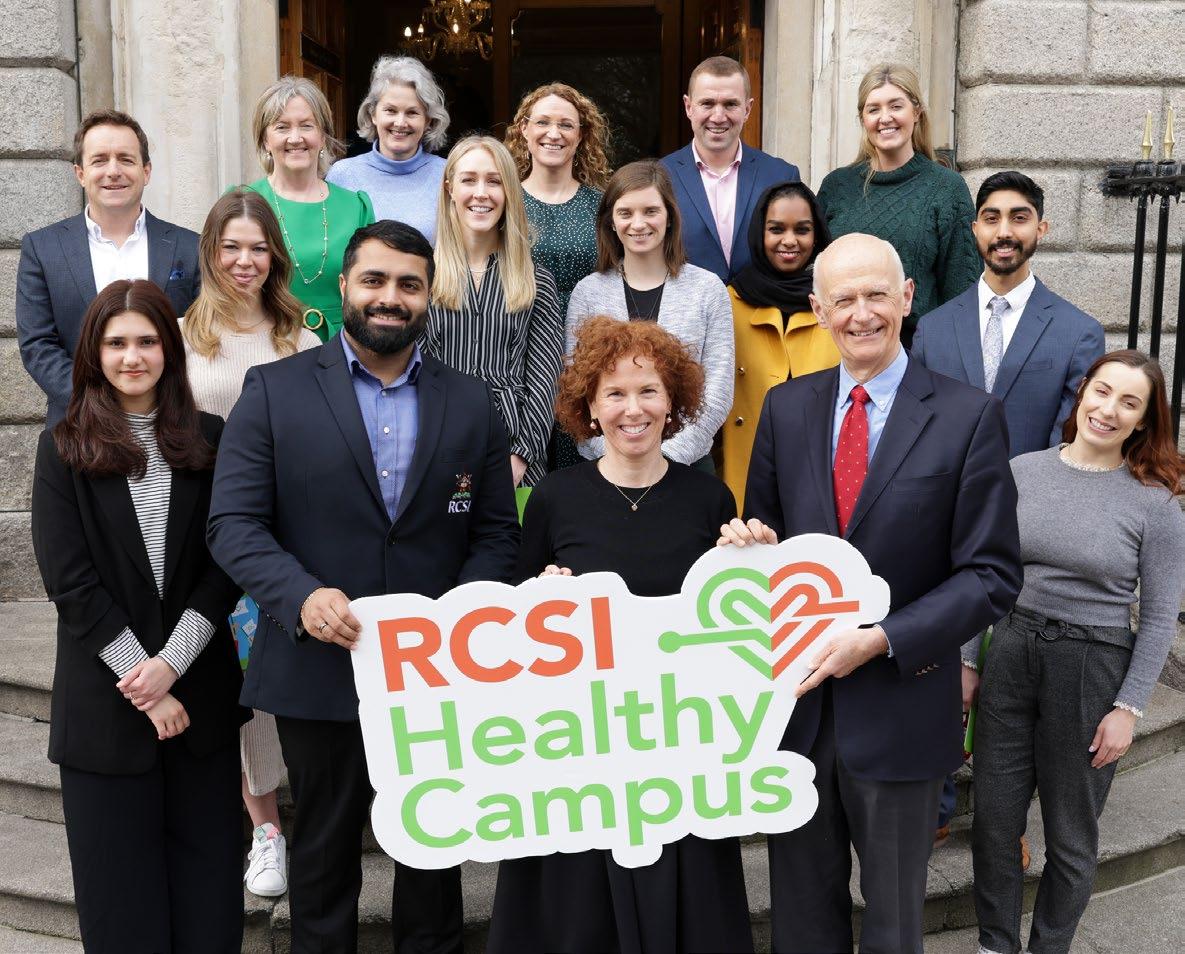



In 2023, in
It is RCSI policy to promote energy awareness across the campus, encouraging staff, students and stakeholders to minimise energy use where possible.
The following key points are communicated to everyone working for or on behalf of RCSI:
1. Energy Policy: The Energy Policy, signed by the Vice Chancellor & CEO/ Registrar, is displayed in RCSI 123 SSG reception area and copies are on Work Vivo and SharePoint (Energy Folder). Everybody should familiarize themselves with the policy.
2. Personal Contributions: Everyone has a responsibility to contribute to the effectiveness of the energy management system, and to assist RCSI achieve its energy targets of a 51% carbon reduction and 50% energy performance improvement by 2030. You can contribute by minimising energy use in your work environment, for example:
a. Switching off lights and office equipment when not required;
b. Managing the operation of windows to avoid unnecessary heat loss, whilst balancing this with minimum ventilation requirements;
c. Switching off fume cupboards or, where it is not safe to do so, closing the sash
d. Switching off lab equipment;
e. Considering energy efficiency when procuring energy using equipment, described in our Procurement Guidance
3. Benefits: By managing energy efficiently, decarbonising the energy we use and maintaining a certified energy management system, we help minimise our impact on the climate, minimise our energy costs and enhance our reputation.
4. Impact: RCSI has been working on its energy performance for more than a decade and reports its progress annually to SEAI. Our performance has improved by more than 45%.
In 2024 we shall provide training to make all staff aware of:
> Our Energy Efficiency and Carbon Reduction targets
> Our Energy Policy
> Our Energy Management System (EnMS)
> The benefits of improved energy and carbon performance, and how they can contribute to the effectiveness of the energy management system, including achieving our objectives, energy and carbon targets
> The impact of their activities or behaviour with respect to energy performance
> The implications of not conforming with the energy management system requirements.
The remit shall be broadened to include other aspects of sustainability in subsequent years.
Our SDG & ME programme educates and supports staff and students on campus.
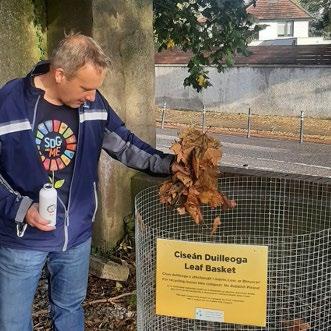
A new Moodle Sustainability Resource is currently in development. The new dedicated online space is being designed to empower our staff and students to actively engage in and contribute to the journey toward sustainability within RCSI.
In a time where the intersection between healthcare, education, and environmental responsibility is so important, this platform will serve as a central hub for information, resources, and learning opportunities that support our staff and students to creating a sustainable future for generations to come.
RCSI have committed to the SEAI ‘Reduce Your Use’ Campaign and will establish a ‘Switch Off’ Campaign to target lighting and equipment which is left on after working hours.
RCSI, in conjunction with the Irish Research Council (IRC), has funded a new study assessing the health and wellbeing impact of the Let it Bee biodiversity project, which trained farmers as beekeepers to raise awareness of the harmful effects of pesticides.

In 2024 we shall assess the necessary competence of staff (and other persons doing work under our control) that affect RCSI’s energy performance and energy management system. We shall ensure these persons are competent and, where applicable, act to address any gaps.
This shall be broadened to include climate action and sustainability.
We shall also put in place a system to:
• Annually assess and keep records of competency.
• At least annually provide staff awareness training, including of recently hired staff.
• Mandatory staff training module on moodle
In 2024 we will commence leadership training for RCSI Senior Management in climate action.
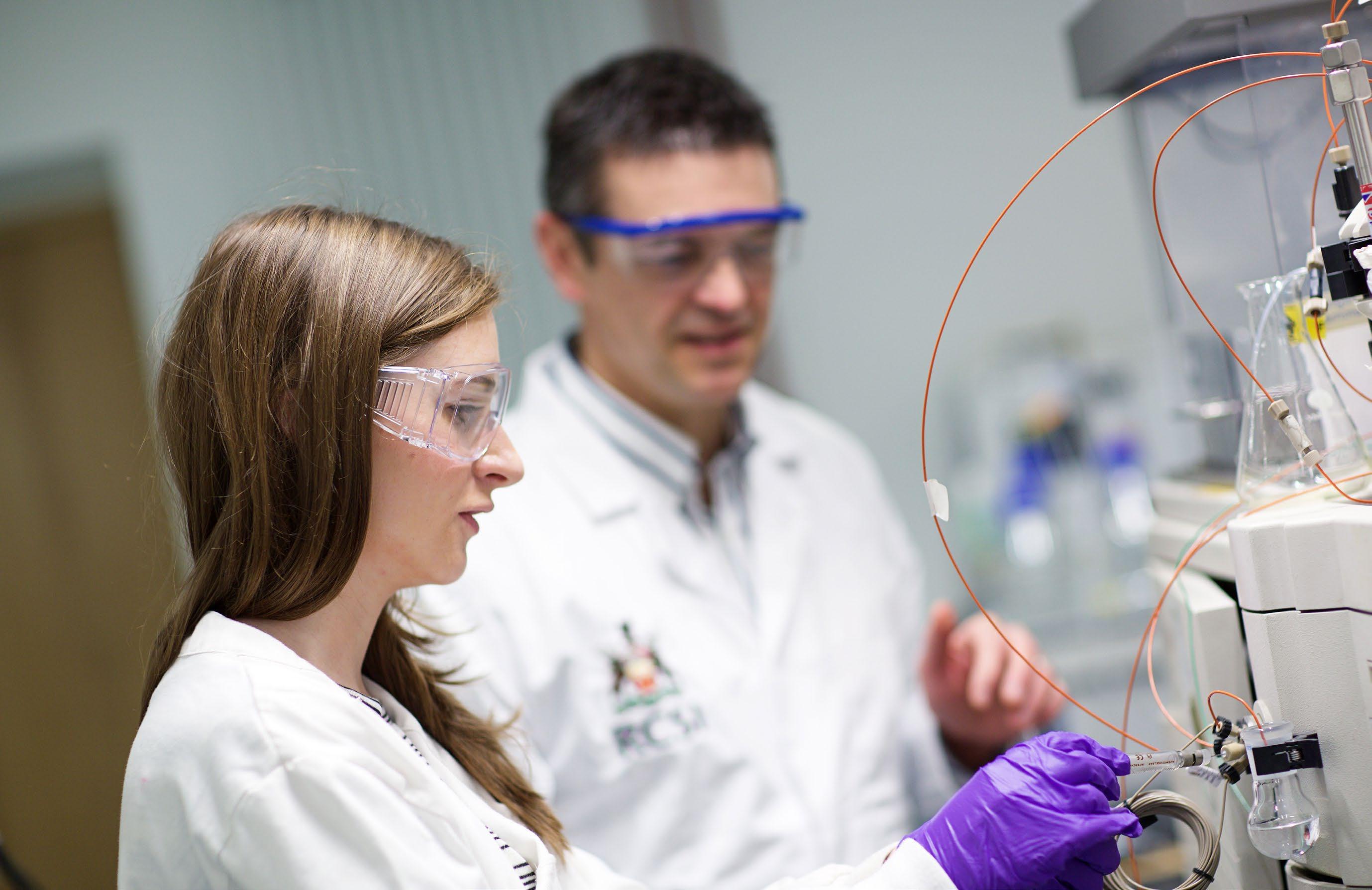
RCSI is committed to delivering the RCSI Strategy 2023-27 ‘Innovating for a Healthier Future’ by developing a campus which is a beacon within the Higher Education Authority (HEA) sector, with a best practice approach to the environment, energy performance and sustainability.
As a leading medical professional and educational institution, we recognise and embrace our responsibility to equip our students with the knowledge, skills, and values necessary to address complex global challenges while promoting sustainability in healthcare practices. Through our curriculum, research and community engagement initiatives, we strive to instill a deep understanding of the connection between health, society, and the environment. By fostering a culture of ESD, we empower our students to become compassionate healthcare professionals and agents of positive change, dedicated to promoting health equity, environmental stewardship, and social responsibility in their future careers.
In 2020, RCSI in conjunction with the Irish Doctors for the Environment, formed a network of seven universities representing all medical schools across the island of Ireland, entitled Climate Health in Medical Education (CHIME). The project has brought together academic staff to agree what should be included in planetary health curricula for medical students. The CHIME team developed an outline curriculum for medical schools, which is now being integrated into medical curricula across Ireland.
At RCSI, this has included integrating content throughout the Population Health and Healthcare delivery theme, the development of a student selected module on Climate and Health, and new lectures on climate and health and a project on sustainable healthcare. RCSI has also developed a non-accredited online module on sustainable healthcare which will be available worldwide later this year. The curriculum is now being considered for integration into other health professional programmes at RCSI.

At RCSI, we know the pivotal role that research plays in addressing pressing environmental, social, and health challenges facing our world today. Our researchers are dedicated to conducting innovative studies that contribute to sustainable healthcare solutions. We prioritise interdisciplinary collaboration, seeking to bridge gaps between healthcare, environmental science, and policy domains to generate impactful research outcomes. By fostering a culture of sustainability within our research community, we aim to advance knowledge, drive positive change, and ultimately contribute to creating a healthier and more sustainable future for all.
During the period 2018-2023 RCSI had over 8,500 publications relating to clinical and translational medicine and population health. Over 3,500 were classified as contributing to “UNSDG3 Good Health and Wellbeing” (Source: SciVal March 2024). Work is underway to further map our research outputs to UNDSG impact to encourage research staff to pursue grants and publications supporting UNSDGs. International research projects such as SurgAfrica, Akazi, KidSurg, Waterspoutt and Paniwater and all exemplars of RCSI’s global impact on sustainability. Sustainable research is also supported by the work of the Green Lab Group.

SDG 3: Good Health and Wellbeing
SDG 4: Quality Education
SDG 10: Reduced Inequality
SDG 16: Peasce, Justice and Strong Institutions
SDG 5: Gender Equality
SDG 9: Industry, Innovation and Infrastructure
SDG 7: Affordable and Clean Energy
SDG 2: Zero Hunger
SDG 11: Sustainable Cities and Communities
SDG 6: Clean Water and Sanitation
SDG 1: No Poverty
SDG 8: Decent Work and Economic Growth
SDG 13: Climate Action
SDG 12: Responsible Consumption and Production
SDG 15: Life on Land
SDG 14: Life below Water
RCSI is undertaking research in Measurement of carbon emissions from the current practice for cataract surgery and the Development of a new cataract pathway with the lowest emissions for each step of patient care pathway.

RCSI have set out a roadmap for reducing the carbon footprint of surgery in Ireland, while at the same time ensuring delivery of safe and effective surgical care. The surgical suite is a unique carbon hotspot within the hospital setting. It is three to six times more energy intensive than a clinical ward. The ‘Sustainability Principles and Practice in Surgery’, produced by the RCSI Council Sub-Committee for Sustainable Surgery, reviews best practice and seeks to enhance the collective knowledge of surgeons and influence the behaviour of the whole surgical team towards delivering a leaner and low-carbon model of surgical care.
RCSI was also an active member of The Green Surgery Net Zero Carbon commission project during 2023 led by the Royal Colleges of Surgeons across the UK and Ireland to produce The Green Surgery Report.
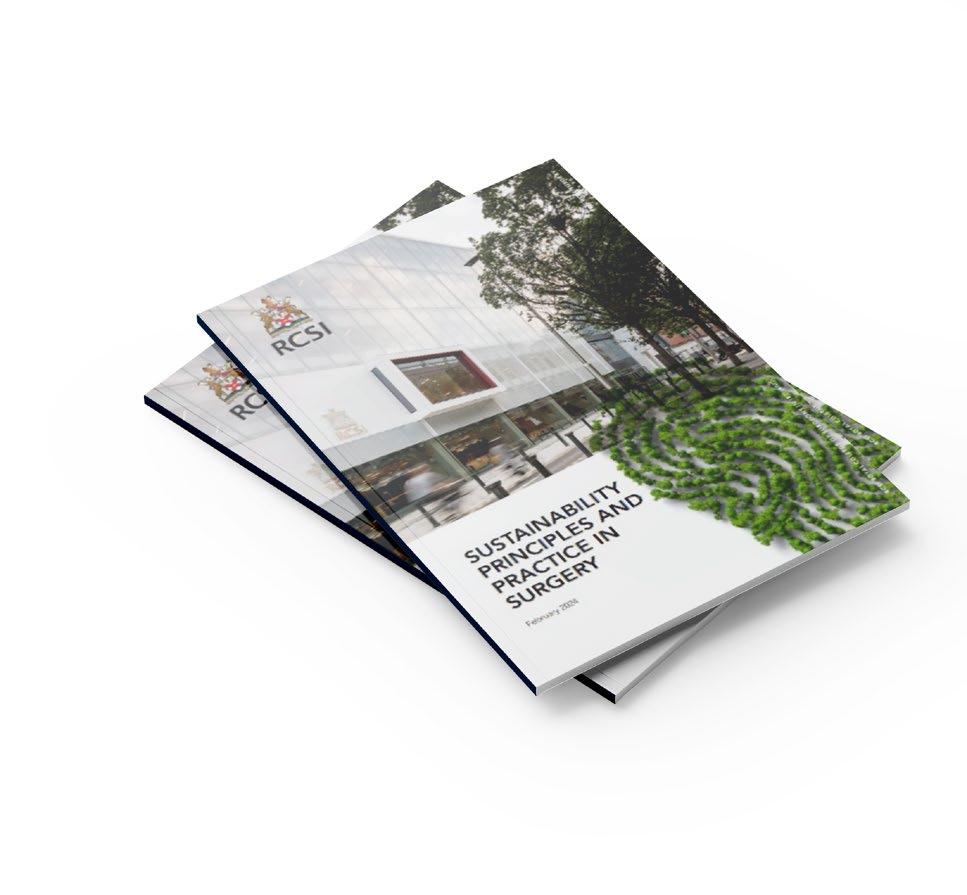
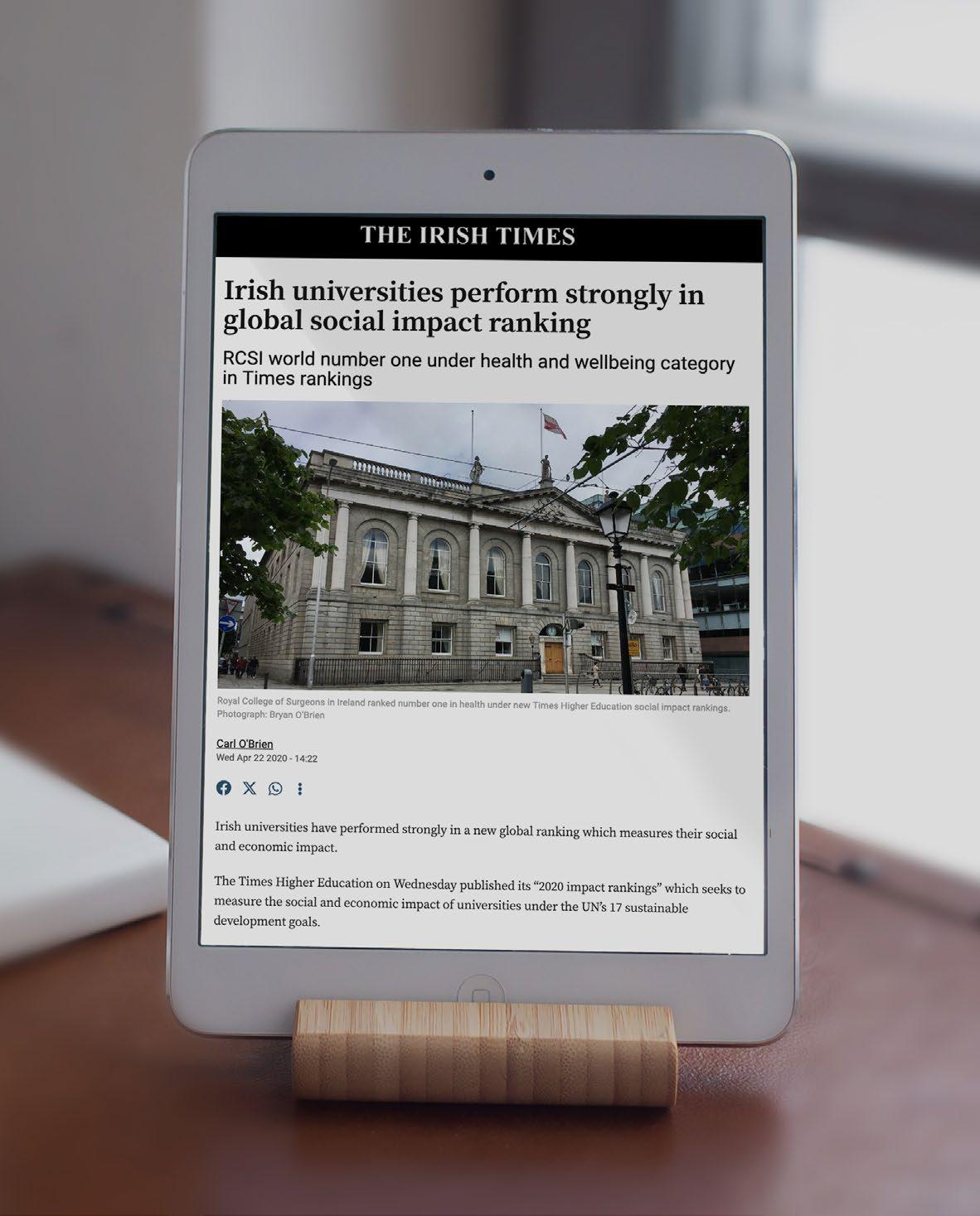
Given the unique role universities play in creating and sharing knowledge, as a community they are critical contributors to achieving the challenges set out in Transforming our world: the 2030 Agenda for Sustainable Development. At RCSI we recognise and embrace our responsibility to achieving a sustainable future for all. We will continue to contribute to the achievement of the United Nations’ Sustainable Development Goals, particularly those goals focused on health, education and environmental sustainability. To enhance our relevance and impact, we will work side-byside with patients, the public and our community.
RCSI is currently ranked first in the world for its contribution to UN Sustainable Development Goal 3, Good Health and Well-being, in the Times Higher Education (THE) University Impact Rankings 2023. We are committed to integrating the UN Sustainable Development Goals into our work. This is achieved in part by incorporating sustainability into our education programmes, ensuring our activities are environmentally responsible and by leveraging our role as leaders in health care to influence positive progress across the sector.

As a result of the work of the RCSI Green Campus Group, in 2019 RCSI obtained the Green Flag by An Taisce’s Green Campus programme on behalf of the Foundation for Environmental Education. This internationally recognised accreditation was announced following a rigorous assessment process.
The Green Campus Programme is an international environmental education and award scheme that promotes long-term, whole institution action for the environment that empowers both students and staff to create a more balanced campus community and to reduce environmental impacts and associated costs. RCSI is currently pursuing renewal of our Green Flag and the Sustainability and Climate Health Committee is developing the organizations submission.

RCSI maintains ongoing engagement with our students on topics relating to Sustainability and Climate Action through our student led Environmental Society. The student society ‘Enviro Soc’ maintain a busy calendar of informative events and initiatives collaborating with various RCSI departments.
Beginning this year with an informative recycling quiz, educating students on the significance of various recycling symbols and the appropriate bins for items like light bulbs, tape, and coffee pods. At a recent Christmas event featured a sustainable gift-wrapping station, encouraging the use of brown paper and twine for wrapping gifts or honey jars generously donated to embrace sustainability during the festive season.
Lastly, at a recent Women’s Wellness Symposium, ‘Enviro Soc’ highlighted sustainable period products alongside launching RCSIs sustainable period products on campus with the support of various societies and campus staff. Collaborating with students in this way supports RCSI in delivering our commitment to Sustainability and Climate Action.
RCSI actively facilitates hybrid working for all staff, and this has helped us to optimize our facilities and to make use of underutilised spaces. With the use of space management technology, RCSI Estates are constantly working to optimise space use on campus to reduce energy and the resultant emissions.
As a public body RCSI carries out annual energy consumption and emissions reporting through the SEAI Monitoring & Reporting portal, the energy performance is then reviewed with the RCSI Energy Management and Senior Management teams. This process enables the key members of the organization who manage and influence the energy performance of our building stock, to discuss progress and identify key areas for improvement.
RCSI is fully compliant with SI No. 426, European Union (Energy Efficiency) Regulations 2014 and all associated legal requirements.
As part of the SEAI M&R, RCSI monitor and report their carbon emissions associated with official business travel, this includes; air travel, cars and couriers. RCSI is developing a Sustainable Business Travel Policy which will incorporate Circular 01/2020: Procedures for Offsetting the Emissions Associated with Official Air Travel as per the Climate Action Mandate.
RCSI have established an Energy Management System (EnMS) in line ISO 50001: 2018 – Energy Management Systems and our goal is to be ISO certified in 2024. The EnMS applies to all present and future buildings under the direct control of RCSI (i.e., where RCSI is responsible for the energy costs), it includes all the activities, operations and services associated with staff, students, and visitors to RCSI University buildings.
RCSI will implement Sustainable Procurement processes and publish an RCSI Sustainable Procurement Policy to reflect this. This policy is being established to encourage sustainable procurement practices and source goods, services or works with a reduced environmental impact.
It is RCSI’s policy to ensure that energy performance and efficiency is integrated into the design process for all construction activities delivered or commissioned by the University. All new buildings are designed and built to the latest NZEB standards and where possible external validation such as BREEAM or LEED is secured.
Energy conservation is a central element in the design of new buildings, major renovations/projects and minor renovation/projects. Almost any work project offers an opportunity for incremental improvement in energy performance, with a significant cumulative benefit over time. Furthermore, it is generally far more cost effective to implement energy opportunities in conjunction with other work, rather than as stand-alone energy projects. Therefore, on all capital project and smaller projects RCSI implement the Energy Efficient Design process in line with IS 399.
MyGreenLab assesses the following: Community, Recycling and Waste reduction, Resource management, purchasing, green chemistry & biologics, water, plug load, fume hoods, cold storage, large equipment, infrastructural energy, field work, animal research and travel. RCSI has an active Green Labs programme with the School of Pharmacy and Bimolecular Sciences and the Department of Physiology certified in December 2022. In 2023, Department Of Chemistry, Anatomy & TERG and our Education and Research Centre in Beaumont Hospital all received ‘Green’ certification. As of January 2024, the Department of Surgery received ‘Green’ accreditation and most of the remaining labs have either completed their baselines or have begun the process. RCSI are on target to have all labs accredited by the end of 2024.
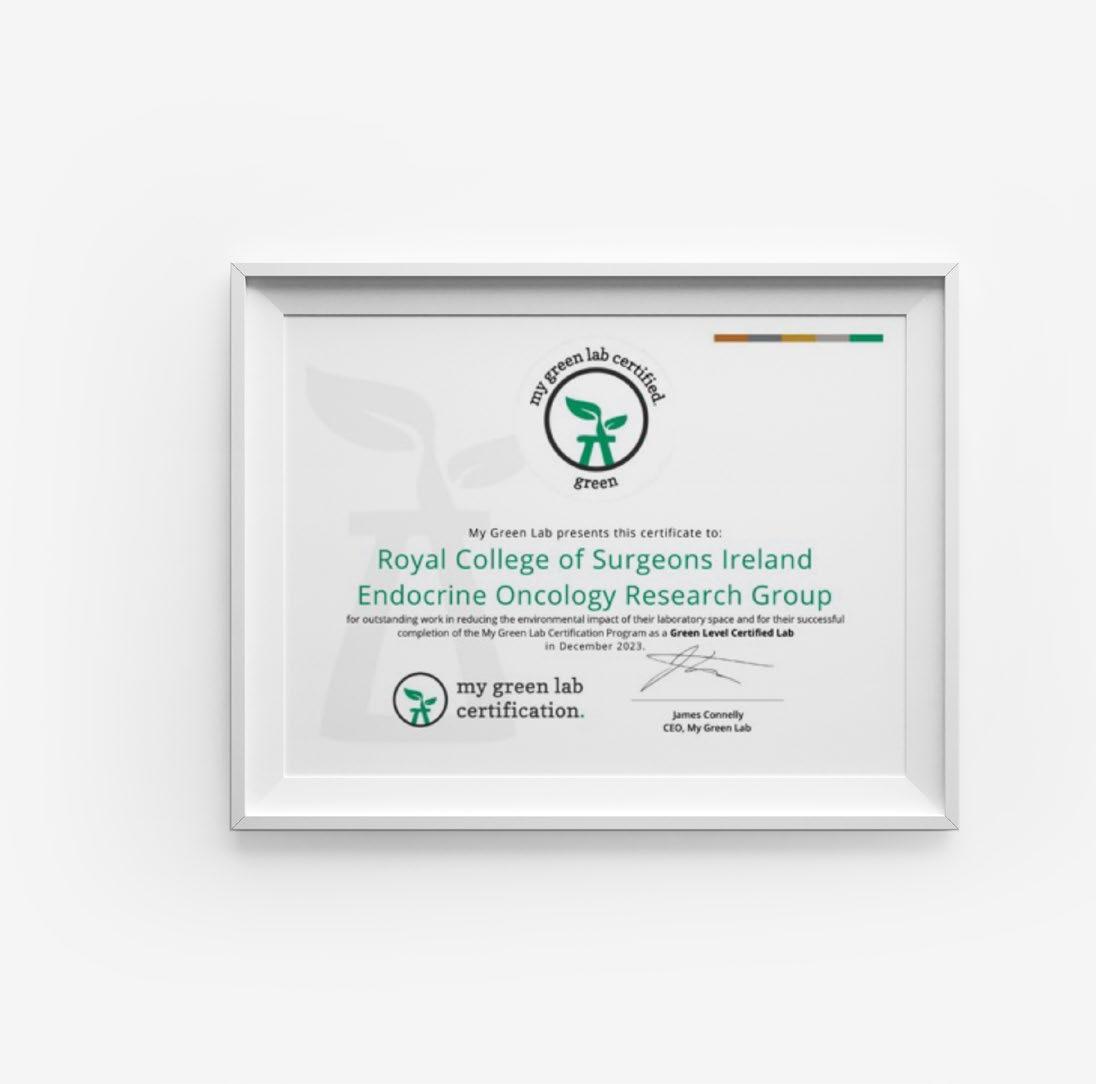
RCSI continually develops printing procedures to ensure the University limits unnecessary printing.
• Printing is set to mono, double sided printing by default.
• To reduce power consumption the printers are set to go into sleep mode after 5 minutes of inactivity.
• Cartridges, waste toners and old printers are taken and recycled by our provider after they are used up.
• We operate our devices for as long as possible (10yrs+) and only replace when devices are no longer usable.
• We are limiting the procurement of new printers, and reducing the number of print devices on campus, by not replacing broken devices where there are others in close proximity.
• All new buildings will have a limited number of devices per floor (max 2).
• We have a print management system that measures device outputs and environmental impact allowing RCSI to monitor run hours, carbon footprint, and equivalent trees in print paper.
RCSI will continue to review paper-based processes and establish a procedure for digitizing a considerable proportion of internal work.
RCSI’s water conservation works have resulted in a 62% reduction in water use since 2019 through the implementation of several water efficiency initiatives.
Water Management good practice at RCSI:
• Monitoring monthly consumption through meter reading
> fitting flush volume reduction devices on WCs;
> fitting tap flow rate restrictors;
> Green Labs initiatives installation of tap flow aerators and promoting reduced water use with researchers.
> fitting urinal water control devices.
In 2023, RCSI achieved a 12,000kg year on year reduction in waste compared with 2022 totals. This was achieved through robust enforcement of our waste management policy, by growing awareness through our committee and encouraging and educating staff and students through ‘Reduce your Use’ campaigns.
• Tracks waste production and set out plans to reduce waste generated
• Procurement processes are set up so that a) waste contractors contribute towards our overall aims and objectives, and b) waste is embedded at the heart of construction, refurbishment and procurement operations to design waste out of projects and purchases from the outset.
• Waste management facilities across campus are sufficient, fit-forpurpose, provide continuity and display a clear visual identity
• Identifies waste streams where there is significant potential to prevent, reuse or increase recycling and put action plans into place
• Develops robust, transparent systems for monitoring and measuring all waste activity.
• Polystyrene Recycling Pledge – alongside our lab teams we will continue to recycle polystyrene and analyse the polystyrene waste stream metrics
Reducing single use plastic is a top priority and since 2022 RCSI has significantly reduced single use products across campus..
As already outlined, our strategy is to reduce, reuse and recycle before considering alternative options.
In 2018 RCSI removed 200,000 disposable cups from staff rooms which equates to 3.5 tons annually. We have removed plastic cutlery, plastic straws and styrofoam takeaway containers. All takeaway food packaging on campus is compostable.

Buildings
Display Energy Certificate
RCSI display up-to-date Display Energy Certificates (DECs) in all campus buildings.. This certificate clearly illustrates the Building Energy Rating for viewing by the public. Display Energy Certificates assessments were carried out by a registered DEC assessor.
Fossil Fuel Heating Policy
RCSI’s Sustainable Buildings Design and Procurement procedures includes a Fossil Fuel Heating policy which illustrates RCSIs commitment to no longer specify fossil fuel heating plant in any new builds or retrofits after 2023.
Building Stock Plan
RCSI are developing a detailed Building Stock Plan with the view to identifying key buildings that would be classified as significant energy users for deep energy retrofit, see ‘Projects Under Development’.
Vehicles
RCSI does not own a vehicle fleet, but we are avid promoters of sustainable transport
Sustainable Transport
RCSI is conveniently located in Dublin City Centre with many forms of public transport right on our doorstep. All sustainable transport methods are captured in the RCSI’s Sustainable Commuting Guide which is promoted to staff and students. The guide was developed to support students and staff who wish to travel in a more sustainable way and help to reduce our travel-related carbon footprint.
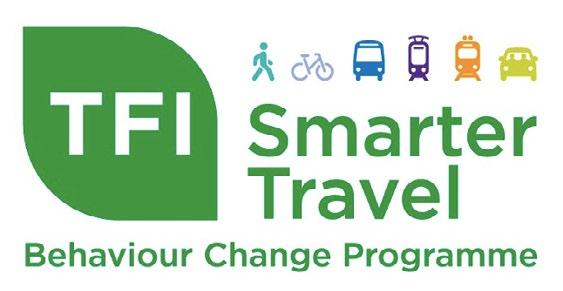

Within support of RCSI’s commitment to sustainable travel, we have partnered with the National Transport Authority and Transport for Ireland on their Smarter Travel Programme. This programme will enhance our commitment to active and sustainable travel for staff and students. We have excellent facilities for promoting sustainable travel, localised bike racks, Luas and bus access, shower facilities and commuter tax saving scheme for bus and train users.
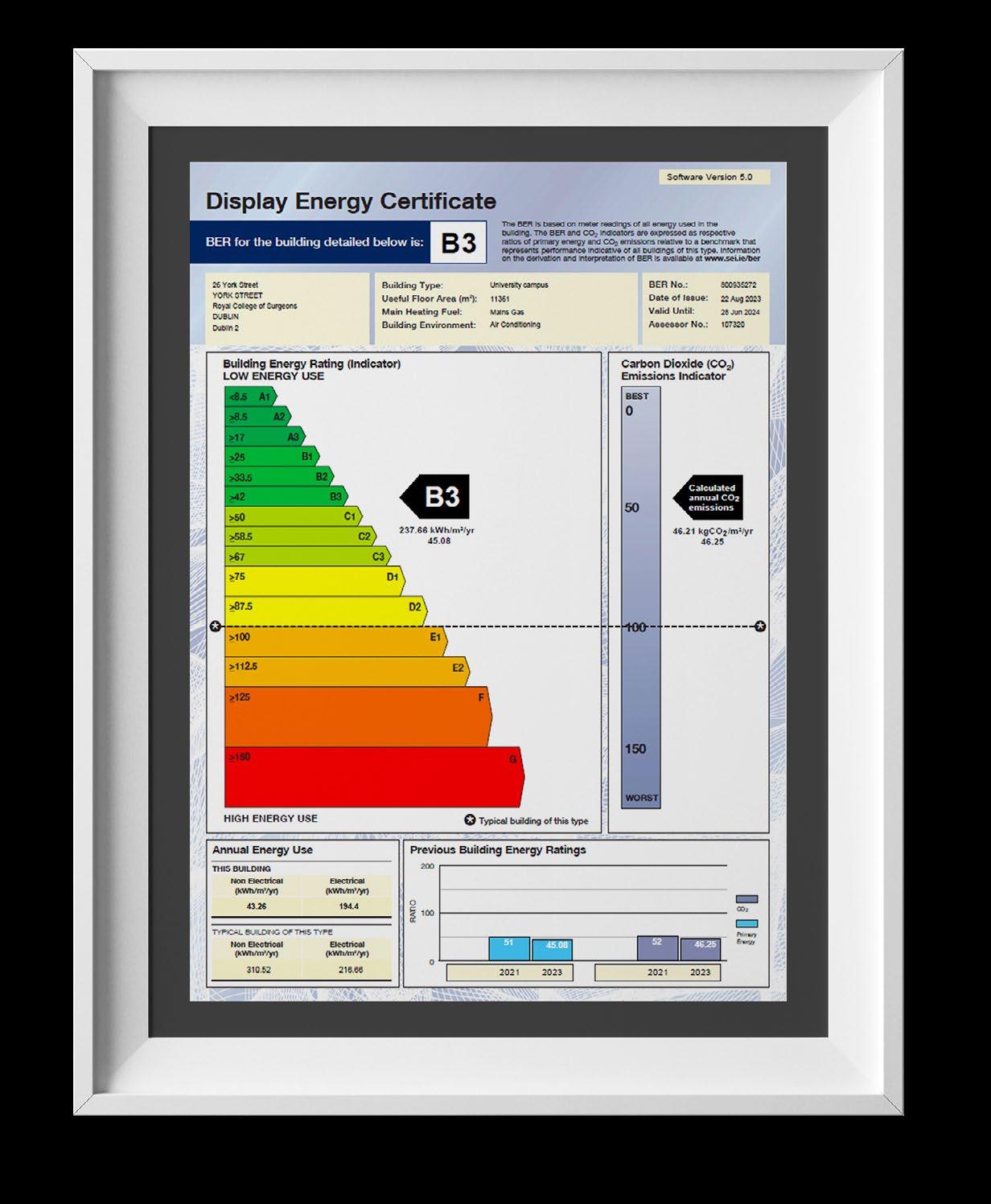
RCSI University of Medicine and Health Sciences is committed to creating a sustainable future for generations to come, this stems from the from the highest level of leadership at RCSI. This goal is integral to our institutional strategy “Innovating for a Healthier Future (2023-2027)” and is further expanded in the RCSI Climate Action Roadmap 2024.
RCSI’s Climate Action Roadmap outlines the University’s collective effort to address climate issues. As a World Leading University for Medicine and Health Sciences we are at the forefront of shaping societal change; embedding sustainability into all our health professional’s education, research and healthcare.
RCSI have considered the challenge at hand and recognise the journey required to reach our energy and carbon targets as outlined in Public Sector Climate Action Mandate.
In 2022, we reduced our electricity and fossil fuel consumption, and increased our energy efficiency. This resulted in carbon emissions reductions of 510 tCO2. This highlights the significant contribution from our staff, students, and researchers in opting to embed energy best practices in their day to day activities.
In the lead up to 2030, RCSI has a well-developed plan to close our residual ‘Gap to Target’ of 370 tCO2, which will enable us to achieve our mandated targets and set us on course for Net Zero by 2050.
We would like to sincerely thank the RCSI community of students, staff and stakeholders, without whom our progress to date would not have been possible. We furthermore call on everyone involved to ensure they stay the course and play their part in addressing the existential threat of climate change, one step at a time. Finally, thank you for taking the time to review the RCSI Climate Action Roadmap.
RCSI March 2024.